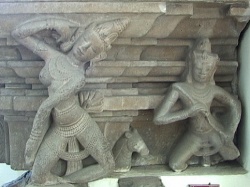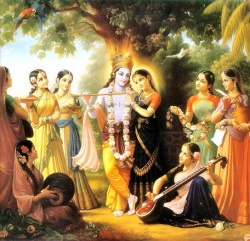Gandharva
Gandharva (Skt.; Tib. དྲི་ཟ་, Wyl. dri za, driza) — 'scent-eaters'
- the 'musicians of the heavens' who reside in the two heavens at the very top of Mount Meru, or
- beings in the bardo who feed on odours.
Source
Gandharva (乾闥婆). A fragrance eater who is also a celestial musician playing in the court of Gods.Gandharva is a name used for distinct heavenly beings in Hinduism and Buddhism; it is also a term for skilled singers in Indian classical music. gandharvas: One of the eight types of celestial beings. Celestial musicians, and feeders on fragrance. Their king is Dhritirastra.
In Hinduism
In Hinduism, the gandharvas (Sanskrit: गन्धर्व, gandharva, Kannada: ಗಂಧರ್ವ, Tamil:கந்தர்வர், Telugu:గంధర్వ) are male nature spirits, husbands of the Apsaras. Some are part animal, usually a bird or Horse. They have superb musical skills. They guarded the Soma and made beautiful music for the Gods in their palaces. A gandharva means a singer in the court of Gods.
In Hindu theology, gandharvas act as messengers between the Gods and humans. In Hindu law, a Gandharva marriage is one contracted by mutual consent and without formal Rituals.
Gandharvas are mentioned extensively in the epic Mahabharata as associated with the devas (as dancers and singers) and with the yakshas, as formidable warriors. They are mentioned as spread across various territories.
Parentage
Various parentage is given for the gandharvas. They are called the creatures of Prajapati, of Brahma, of Kasyapa, of the Munis, of Arishta, or of Vāc.
In Buddhism
A gandharva (Sanskrit) or gandhabba (Pāli) (Japanese: 乾闥婆 Kendatsuba) is one of the lowest-ranking devas in Buddhist cosmology. They are classed among the Cāturmahārājikakāyika devas, and are subject to the Great King Dhṛtarāṣṭra, Guardian of the East. Beings are reborn among the gandharvas as a consequence of having practiced the most basic Form of ethics (Janavasabha-Sutta, DN.18). It was considered embarrassing for a Monk to be born in no better birth than that of a gandharva.
Gandharvas can fly through the air, and are known for their skill as musicians. They are connected with trees and Flowers, and are described as dwelling in the scents of bark, sap, and blossom. They are among the beings of the wilderness that might disturb a Monk meditating alone.
The terms gandharva and yakṣa are sometimes used for the same person; yakṣa in these cases is the more general term, including a variety of lower deities.
Among the notable gandharvas are mentioned (in DN.20 and DN.32) Panāda, Opamañña, Naḷa, Cittasena, Rājā. Janesabha is probably the same as Janavasabha, a Rebirth of King Bimbisāra of Magadha. Mātali the Gandharva is the charioteer for Śakra.
Timbarū (Tumburu) was a chieftain of the gandharvas. There is a romantic story told about the Love between his daughter Bhaddā Suriyavacchasā (Sanskrit: Bhadrā Sūryavarcasā) and another gandharva, Pañcasikha (Sanskrit: Pañcaśikha). Pañcasikha fell in Love with Suriyavacchasā when he saw her Dancing before Śakra, but she was then in Love with Sikhandī (or Sikhaddi), son of Mātali the charioteer. Pañcasikha then went to Timbarū's home and played a melody on his lute of beluva-wood, on which he had great skill, and sang a Love-song in which he interwove themes about The Buddha and his Arhats.
Later, Śakra prevailed upon Pañcasikha to intercede with The Buddha so that Śakra might have an audience with him. As a reward for Pañcasikha's services, Śakra was able to get Suriyavacchasā, already pleased with Pañcasikha's display of skill and devotion, to agree to marry Pañcasikha.
Pañcasikha also acts as a messenger for the Four Heavenly Kings, conveying news from them to Mātali, the latter representing Śakra and the Trāyastriṃśa devas.
Gandharva or gandhabba is also used in a completely different sense, referring to a being (or, strictly speaking, part of the causal continuum of Consciousness) in a liminal state between Death and Rebirth.
In Indian classical music
There are many singers known as gandharvas for their Mastery of Indian classical music. All of them, at one time or another, were theater actors who performed in various musicals. Their style of music is known as Kula Sangeet in Marathi, literally "heredietry music". They are regarded as masters of Indian classical music by the vast majority of the general population, predominantly in the state of Maharashtra.

